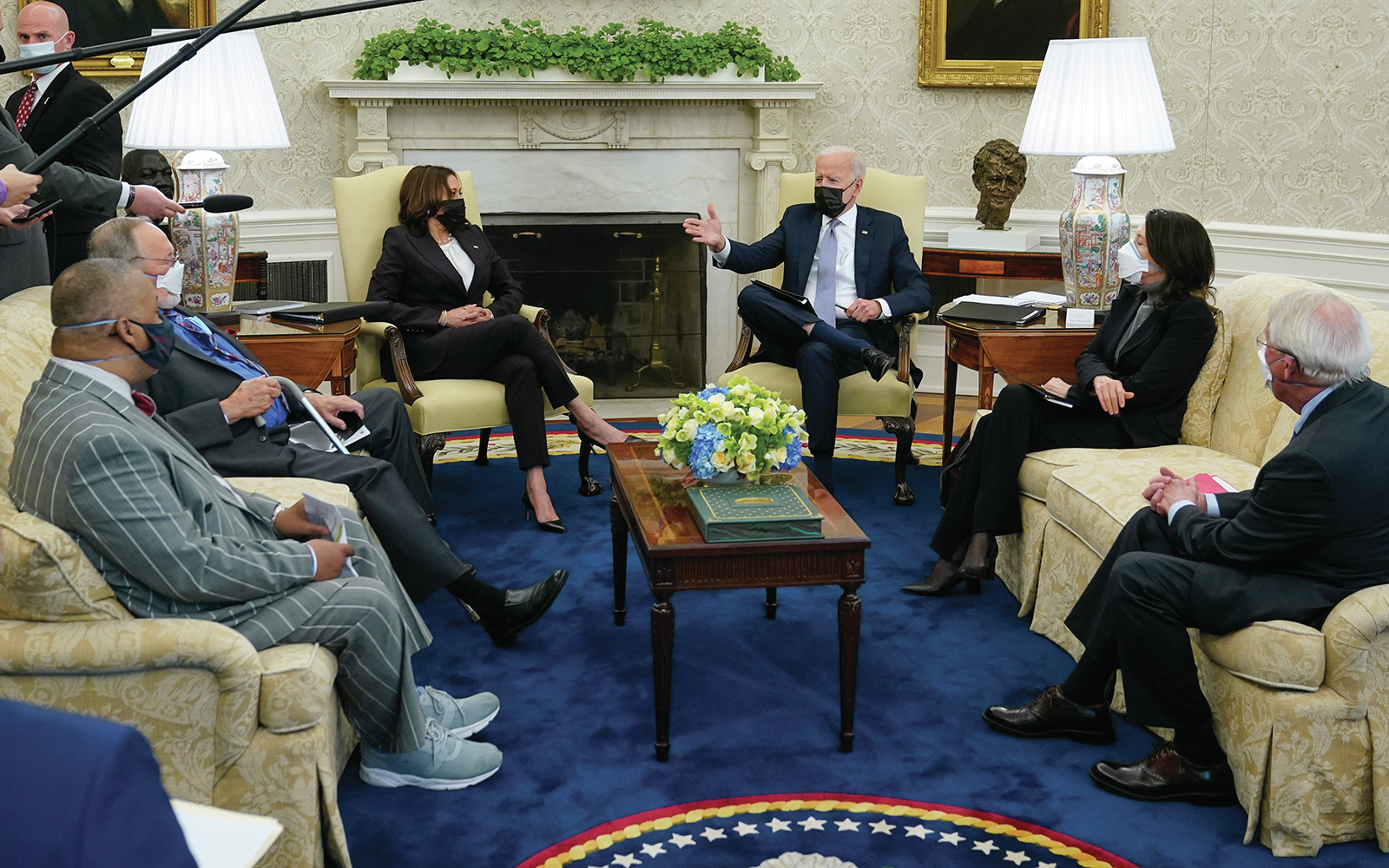Flying aboard Air Force Two, Vice President Kamala Harris landed at Oakland International Airport, slightly before 10 a.m. on April 5, where she was eagerly met by California’s Lt. Gov. Eleni Kounalakis, Congresswoman Barbara Lee and Sen. Alex Padilla. Piling into the presidential motorcade, the three California democrats were driven to the East Bay Municipal Utility District’s Upper San Leandro water treatment plant.
Convening with the vice president and her fellow colleagues at the facility, Gov. Gavin Newsome joined Harris on a brief walking tour around the plant, followed by their independently delivered speeches, both largely directed towards the water treatment facility workers and members of the press in attendance. According to a report from CBS San Francisco, the vice president spoke first, concentrating on certain aspects of the administration’s proposed overhauling infrastructure package. More specifically, Harris said the American Jobs Plan “would provide an investment of more than $111 billion in the country’s water infrastructure to ensure it’s safe and equitable.”
Moments after, the vice president began speaking on the country’s inequities, primarily concerning public access to clean water. Harris boldly and unashamedly declared that, “For years there were wars fought over oil; in a short time there will be wars fought over water.” Evoking mental images of a barren, Mad-Max-esque landscape where blood is regularly shed for water, Harris’s words succeed far beyond merely raising public awareness about an increasingly viable threat facing future generations. Her words are an invaluable reminder of the country’s long-standing and undying hazards. Merging state power with corporate interests is an intensifying issue in the U.S. today. Of course, this ever-present risk accompanies other pre-existing jeopardies to both American civil liberties and global stability, including the rapid construction of the surveillance state, obliteration of the right to privacy and unlawful corporate monopolies.
The U.S.’s internal post-World War II threat was most notably brought to light by the decorated 34th President of the United States, Dwight D. Eisenhower. Broadcasting his farewell address from coast to coast on Jan. 17, 1961, Eisenhower summoned the courage to speak candidly about the adverse emergence of what he famously referred to as “the military-industrial complex.” Ike’s forewarned threat consists of mutually beneficial relationships between the nation’s most profitable military defense contractors, elitist government officials and elected legislators either in or seeking a position of power. Sometimes referred to as the iron triangle, when these three clusters of government power collaborate, they not only collectively possess the keys to the world’s most feared arsenal, but practically ensure an inevitable decay if not total decimation of traditionally held democratic values and national institutions.
In his final presidential speech, Eisenhower profoundly warns, “This conjunction of an immense military establishment and a large arms industry is new in the American experience. The total influence—economic, political, even spiritual—is felt in every city, every Statehouse, every office of the Federal government. We recognize the imperative need for this development. Yet we must not fail to comprehend its grave implications. Our toil, resources and livelihood are all involved; so is the very structure of our society. In the councils of government, we must guard against the acquisition of unwarranted influence, whether sought or unsought, by the military-industrial complex. The potential for the disastrous rise of misplaced power exists and will persist.”
Adding a dense layer of credibility to Eisenhower’s six-decade-old warning, compelling figures recently published by the Center for Responsive Politics emit a blinding light on the U.S. defense sector’s exorbitant lobbying expenditures. For instance, the February 2021 report indicates that over the past two decades, defense companies “have directed $285 million in campaign contributions and $2.5 billion in lobbying spending to influence defense policy.” Furthermore, out of the 200 defense companies that willingly reported lobbying the federal government in 2020, the year’s top five biggest lobbying spenders—Lockheed Martin, Boeing, Northrop Grumman, Raytheon Technologies and General Dynamics—account for more than 50% of the industry’s total lobbying costs.
Despite heated cable news debates between hawkish Republicans and Democrat doves, there is a purposefully subtle but unrelenting bipartisan support for maximizing the national defense capability. Finally declaring a well overdue, full-scale troop withdrawal from Afghanistan, by the 20th anniversary of the Sept. 11 terror attacks, President Joe Biden will serve as the fourth and final president presiding over this nearly 20-year military conflict. However, this apparent act of military regression will not be one of the Biden Administration trends; quite the opposite actually.
On April 9, Biden requested $753 billion for national security funding as part of his developing fiscal 2022 budget. This was a 1.6% increase in military spending and even includes a staggering $715 billion for the Department of Defense. Standing as the most remarkable aspect about this expansive funding request, the proposed funding total is considerably short of the Trump Administration’s projected budgetary request of $722 billion, dispelling any false narratives concerning Democrat-led crusades to reallocate portions of the defense budget.
The profundity within Eisenhower’s farewell address continues to demonstrate itself in real-time, as the U.S. witnesses historic rates of corporate growth and seizures of power. Deeply embedding a capital-oriented business within the realm of civil service has produced mixed results over the years. However, the damage produced by the corporate state’s innumerable acts of malfeasance is far too harmful to justify any leniency on the matter.
Hyperpartisan sensationalist media outlets like CNN, The Young Turks and MSNBC successfully deluded Americans into believing that the fairly uncouth, brash rhetoric and unconventional character of former President Donald Trump was just the worst thing that happened to the U.S. since Pearl Harbor. In fairness, both Obama and Trump spent more on their defense budgets than any presidential administration since World War II. These same outlets were also responsible for the last four years of nonstop bombshells, catastrophe-ridden headlines and meticulously working to keep the myth of Russian collusion alive.
It’s well worth mentioning that the somewhat controversial guerilla journalism tactics of James O’Keefe and his newsgathering organization Project Veritas captured CNN Technical Director, Charlie Chester, on video saying, “Like, our (CNN’s) focus was to get Trump out of office. … Without saying it, that’s what it was.” In a separate interaction caught on video, Chester refers to an incident where CNN was creating a story on Trump’s possibly deteriorating neurological condition as “propaganda.” In reality, the Trump Administration was relatively tame to the prior two administrations as well as his replacement.
Regardless, if citizens cannot hold bodies of corporate, state or media power in check, then who can? The U.S.’s current system of applauded ignorance, illusionary progress, corporate capitalization on virtue and political hypocrisy is unsustainable, and worse, a lot of it is irrefutably unconstitutional.














Be First to Comment